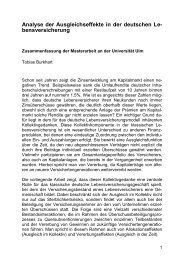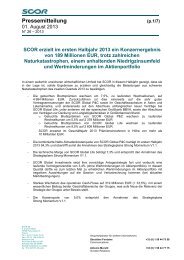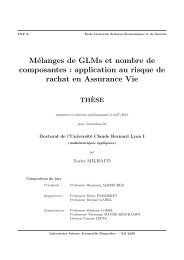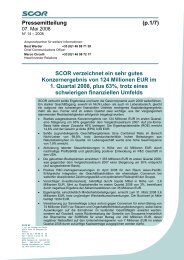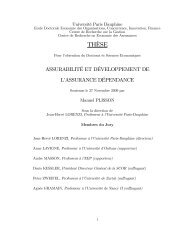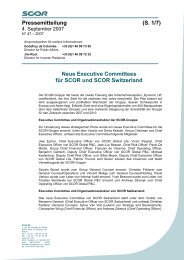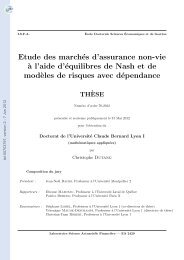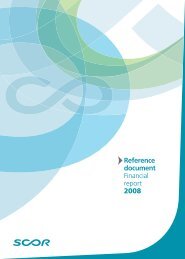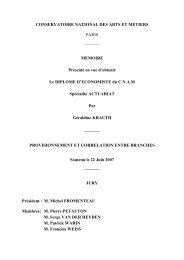4.4 Legal risk - Scor
4.4 Legal risk - Scor
4.4 Legal risk - Scor
You also want an ePaper? Increase the reach of your titles
YUMPU automatically turns print PDFs into web optimized ePapers that Google loves.
4.2.2 SCOR FACES RISKS RELATED TO ITS EQUITY-BASED PORTFOLIO<br />
SCOR is also exposed to equity price <strong>risk</strong>. A widespread and sustained decline in the equity markets could result in an<br />
impairment of its equity portfolio. Such an impairment could affect its net income.<br />
The Group’s exposure to the equity market results both from direct purchases and through certain (re)insurance<br />
products including GMDB business. See “Section 4.1.4 – SCOR could be subject to increased reserves from business<br />
that it does not actively underwrite.”<br />
Equity prices are likely to be affected by <strong>risk</strong>s which affect all of the market (uncertainty on economic conditions in<br />
general, such as changes in gross domestic product (“GDP”), inflation, interest rates, sovereign <strong>risk</strong>, etc.) and/or by <strong>risk</strong>s<br />
which influence a single asset or a small number of assets (specific or idiosyncratic <strong>risk</strong>).<br />
The impact of a uniform drop of 10% in equity markets is included in “Section 20.1.6 – Notes to the financial statements,<br />
Note 26 – Insurance and Financial Risk.”<br />
SCOR is, therefore, exposed to a <strong>risk</strong> of capital losses on its equity exposures - if it were to occur - which could<br />
adversely impact its business, present and future revenues, net income, cash flows, financial position, and potentially,<br />
the price of its securities.<br />
See “Section 20 – Note 26, Insurance and financial <strong>risk</strong> – Market <strong>risk</strong>” for further information on <strong>risk</strong> mitigation actions.<br />
4.2.3 SCOR IS EXPOSED TO OTHER RISKS ARISING FROM THE INVESTMENTS IT OWNS<br />
A. Valuation <strong>risk</strong><br />
Some financial instruments do not have a sufficient and recurrent number of transactions to allow valuation with<br />
reference to a market price and therefore need to be valued using an appropriate model. There is a <strong>risk</strong> that the price<br />
provided by the model is noticeably different from the price which would be observed in the event of rapid disposal of the<br />
financial instrument, which could have an adverse effect on SCOR’s financial position. This <strong>risk</strong> is higher for non-listed<br />
assets, structured products (e.g. asset backed securities, collateralized debt obligations, collateralized loan obligations,<br />
collateralized mortgage obligations, commercial mortgage backed securities, residential mortgage backed securities,<br />
structured notes, etc.) on the loans and on the alternative investment portfolio (e.g. hedge funds, infrastructure,<br />
commodities, private equity, etc.).<br />
For further details on valuation, refer to “Section 20.1.6 – Notes to the financial statements, Note 6 – Insurance Business<br />
Investments.” See also “Section 4.2.5 – The valuation of SCOR’s intangible assets and deferred tax assets may<br />
significantly affect its shareholders’ equity and the price of its securities.”<br />
B. Market disruption<br />
The financial markets context remains uncertain and exposes SCOR to significant financial <strong>risk</strong>s linked to changes in<br />
macroeconomic variables, inflation, interest rates and sovereign debts, credit spreads, equity markets, commodities,<br />
exchange rates and real estate securities but also to changes in the models used by the rating agencies. Due to the<br />
current economic and financial environment, the Group may also be faced with the deterioration of the financial strength<br />
or rating of some issuers.<br />
C. Real estate <strong>risk</strong>s<br />
The rental income of the property portfolio is exposed to the variation of the indices on which the rents are indexed (for<br />
instance in France, the Construction Cost Index) as well as <strong>risk</strong>s related to the rental market (changes in supply and<br />
demand, changes in vacancy rates, impact on market rental values or rent renewals) and the default of lessees.<br />
The value of property assets, owned directly or through funds, is exposed to changes in the investment market itself<br />
(changes in interest rates, liquidity) but potentially also to the <strong>risk</strong> of regulatory obsolescence of properties (regulatory<br />
developments related to the accessibility of buildings for handicapped people, on the reduction of energy consumption<br />
and the production of carbon dioxide, etc.) which would lead to losses of value in the event of a sale of the assets or to<br />
additional expenditure to restore the value of the property.<br />
D. “Side Pockets” or “gates”<br />
SCOR holds shares of private equity or hedge funds or funds of funds in its alternative assets portfolio. Some of these<br />
funds have the possibility to temporarily restrict the liquidity of these shares pursuant to restrictions that are commonly<br />
referred to as “side pockets” or “gates.” The Group does not hold a material portfolio of such assets.<br />
The occurrence of one or more of the above <strong>risk</strong>s could have a material adverse impact on SCOR’s business, present<br />
and future revenues, net income, cash flows, financial position, and potentially, on the price of its securities.<br />
See “Section 20 – Note 26, Insurance and financial <strong>risk</strong> – Market <strong>risk</strong>” for further information on <strong>risk</strong> mitigation actions.<br />
E. Insurance Risks<br />
SCOR holds in its investment portfolio a some securities related to insurance <strong>risk</strong>s (e.g. Insurance Linked Securities<br />
(ILS)). These securities can be indexed bonds ("CAT bonds"), Over-The-Counter (OTC) (e.g. Insurance Loss Warranty<br />
34



